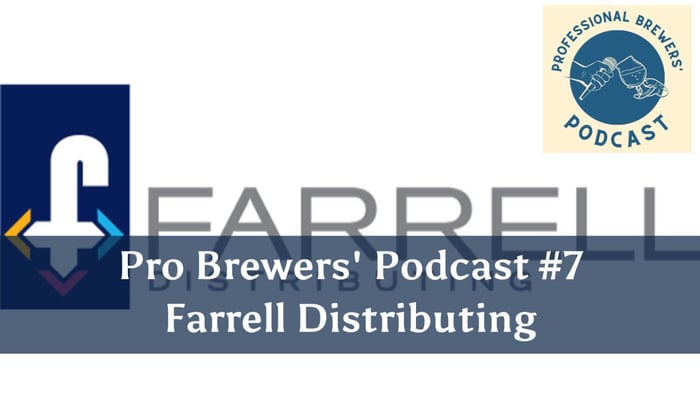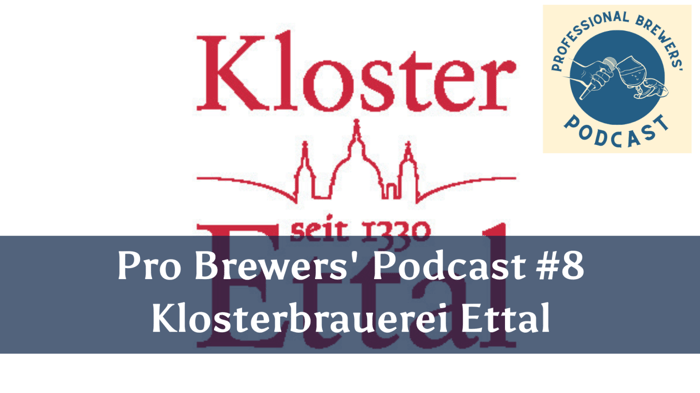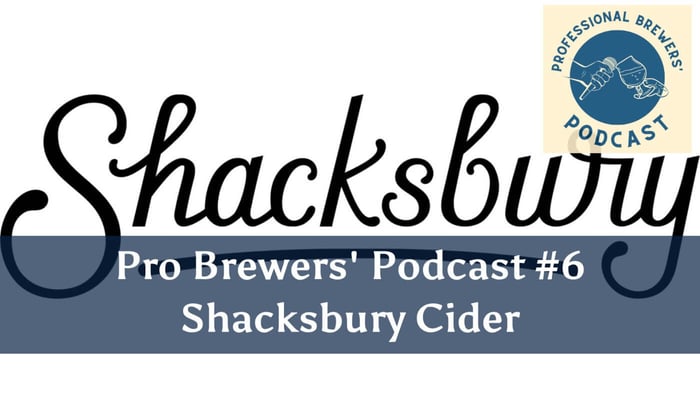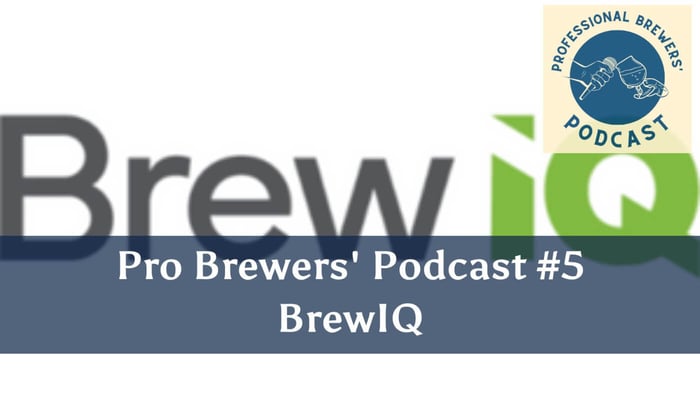On this week’s show I talk to Stuart Timmons from Farrell Distributing in Vermont.
We have a great chat about what a distributor is looking for in a brand and, also, what a brewery should look for in a distributor.
We then discuss the all-important question of how a brewery knows when it’s time to look for help in distribution.
From the Episode
Learn more about Farrell Distributing!

About the Podcast
Welcome to the Professional Brewers Podcast where we interview brewers, brewery owners, and other folks in the industry to take a deep dive into what it takes to have a successful brewing operation.
This show is for brewers of all kinds: folks considering going pro, professional brewers, people who want to look behind the scenes of their favorite breweries, or merely the brewcurious.
Whether you’re hanging over a fifty-barrel mash tun while you listen to this or you’re just starting your professional brewing journey, we hope this show helps you become a better, more profitable, happier brewer.
New episodes every Wednesday!
Transcript
Welcome to the Professional Brewers Podcast sponsored by Groennfell Meadery and hosted by me, Ricky the Meadmaker. This show is for brewers of all kinds, anyone looking to get into brewing professionally, folks who want to peek behind the scenes at their favorite brewery or merely the Brewer Curious. Whether you're an old hand in the industry or you're just starting your professional brewing journey, we hope this show helps you become a better, more profitable, happier brewer.
If you find this show helpful or just enjoy listening to my dulcet tones, please consider supporting us at Patreon.com/professionalbrewerspodcast. There's also exclusive content over there as well as the opportunity to ask questions of upcoming guests.
On this week's show, I talk to Stuart Timmons from Farrell Distributing in Vermont. We have a great chat about what a distributor is looking for in a brand and also what a brewery should look for in a distributor. We then discuss the all-important question of how a brewery knows when it's time to look for help in distribution. And now, without further ado, Stuart from Farrell Distributing.
Stuart Timmons, welcome to the show.
Ricky the Meadmaker, it's great to be with you today.
So you work at Farrell Distributing and I want a little bit of background about you, how you came to the company. But first, can you tell us about the company, your size, and what the distribution scene in your region looks like?
Sure, yeah. Farrell Distributing was actually the first alcohol distributor after Prohibition in Vermont. So moving into our 90th year this December. So quite a long run. We're also into our fourth generation of family ownership. So we're a family-owned and run business. Happy to say that. We are Vermont based only, so only do business within the borders of Vermont. That's not to say that we don't represent products from outside the state. We've got a pretty extensive catalog of beer, wine, some hard seltzer now with the introduction of ready-to-drink cocktails, as well as a growing beverage and snack portfolio. So we've seen us selling snacks such as chips and popcorn when I started with the company in 2006. But that's the direction that some segments have gone and it ends up being a nice little add-on for us when we're out there in the market working with our retailers that we sell to.
Wonderful. So you mentioned you started in 2006. That's right. Yeah, I came to Farrell Distributing originally as a fine wine-focused salesperson. Came from the restaurant business where I've worked back of the house and front of the house for over a decade. Did a lot of French cooking in my days in the kitchen, which I enjoyed and got into wine, the food and wine pairing opportunities with special dinners and different things like that. So it was sort of a natural progression as I felt like I was aging out of the restaurant industry a little bit and wanted something a little more consistent and stable with fewer late nights. So it's been a good transition. And during my time at the company, close to moving on to 18 years or so, I have had a chance to move around a little bit and manage a specialist sales team as well as now moved into the position of director of business development and work closely with our marketing department.
So with that, a couple of weeks back, I spoke with a much smaller distribution outfit, you know, one of those two brothers in a van operations. Can you give sort of a thumbnail sketch? What kind of roles exist in a distributing company of your size? Because if you want to get into distributing, you guys have warehouse managers and forklift operators and people on the street. Just a quick snapshot of a lot of those different roles, what you've done and some of the things that people thinking about the industry might be interested in.
Sure. So at the root of it all, we're in the warehousing and distribution business. Sales is a major part of that from the front-facing portion of what we do with the customer base that we serve being retailers and restaurateurs. We have two warehouses, one in South Burlington being our main warehouse in the northern part of the state and then a second facility down in Rutland that we ship to the lower half of the state from company-wide. We're at about 320 employees and that spread relatively evenly between warehouse drivers, sales, and a pretty robust office personnel that does a lot of the back-end on supplier and portfolio management.
Yeah. So to work for Farrell or another large distributor, what do you think some key characteristics, if someone's trying to figure out if this would be a good fit for them? I mean, on your email, you have like nine accolades after your name, Cicero and things like that. What do you think are nice things to come into the industry with? What do you think you learn on the ground?
Well, I think if you're going to be on the sales side, you have to first of all have not only product knowledge background on what you're going to be selling and working with, but also a real interest in it. Like any career you go into, the job's easier if you do have a true love and interest for what you're doing and the products that you're selling. But then you also need to be able to work with a pretty diverse client base. We've got, in Vermont, we're kind of unique where there's still quite a few very small mom and pop country stores that carry a wide assortment of items, but may do lower volume than you would find in some other markets where there's not the number of independently owned stores like we have here in Vermont. And so when you go into other larger markets outside of Vermont, you're going to see more consolidation with chain-driven retailers, larger restaurants, and hotel chains. Here we're still focused on working with the smaller mom and pop that want to have a diverse selection of offerings, which we try to provide to them through our beer, wine, and non-alcoholic portfolio. But then we do at the same time have some of those larger chain stores, whether it's a grocery chain or a gas convenience store chain, as well as some hotels and larger restaurant groups.
And for your Salesforce, do you divide people, you know, you do this region or you do chains or is it a mix?
It is a little bit of a mix. We do have a chain-driven team that focuses on our grocery channel because that's such a specific type of need where a lot of the placements of products and the monthly programming and planning is done on a top-tier level, it might be done on a national level or if not that on a statewide level with one of our key account managers that calls on that chain. And then when we get outside of the chain team, we have a relatively large group of folks in our sales department that sell to the independent markets. And so with those, that's more of a geographical sort of grouping of an account base so that we try to cut down as much as possible on drive time to make them as efficient as possible. And then those independent sales reps are really the ones that we rely on to have that deep product knowledge so that if they're going into an account, they can speak to our entire portfolio, talk about the hops and a beer, talk about the terroir of a winery in France or California or Spain and then talk about the non-alcoholic products that we sell as well. So it's a lot to ask of someone and it takes time. You know, I always say that I feel like I didn't really start to really understand the broad range of our portfolio until I was here five years and now being here almost 18 years, I've got a pretty good handle on it. But it is a lot to ask and to be able to balance all of that is really what we ask of our team.
Absolutely. And I can see how that time on the ground working with the products, working with the clients, understanding the different tiers of the market is crucial. So let's think about a little bit more about the brewery side of things. So you're looking at a new brewery. What are you looking for in a brand? What are the things that stand out to you that make you say, yeah, we want to work with them?
So I think it's really a multi-tiered approach and different reps and myself included are looking at different things. But some of the key things that I think all of us are looking for are a product that fits within the portfolio that we're trying to build, whatever our focus is at that point in time. But then also a company that is flexible and is easy to work with, has good pricing, understands their market, where they fit within the pricing structure, and what their competitors are selling for. So some of those key things are what we look for.
Are there any things that you think people who are new to the industry, if they're just starting out, are there any things that you think they might overlook or not quite understand when they're trying to approach a distributor, trying to get their product out there?
Yeah, there's a few things. I think that every once in a while, we'll get a sales call from a newer brewery and they've got a couple of flagship beers and then the rest of their portfolio is like a one-off here or there, where they did one run and then they're moving on to the next. It's not that those sorts of breweries can't be successful, but it's just a tougher model when you don't have something that's a consistent offering for your customers. So that's something that we look for, I think. And then also I think the level of business plan and overall business understanding on the part of the brewery to understand what they're asking of us when they come on board and sign up with us. And so there's a lot that goes into it and there's a lot of costs that come along with it as well. And so if you don't really understand that and don't have a plan on how you're gonna make it work, it can be a struggle and it can be a struggle for both the distributor and the supplier. We wanna see them be successful and it's frustrating when we can't get the necessary time and attention from the supplier to get the programming and the necessary support that they need.
Absolutely. So it's not just about the quality of the beer, which is important of course, but it's also about having a consistent product lineup, having a business plan, understanding how the distribution relationship works, understanding the pricing and the competitive landscape. It sounds like it's really a holistic approach to evaluating whether a brand is a good fit for the distributor.
Exactly. And then from there, we wanna also see the activity on the brewery side, where we know that we have a lot of breweries that come into the market and when they first start, they're highly motivated and they're really excited about getting their product out there and they have a lot of enthusiasm. But then sometimes that can taper off and so we wanna make sure that we're seeing activity from the brewery where they're out doing sampling and that they're out working with their retailers and restaurant accounts. And so there's a lot that goes into it, but I think one of the nice things about the way that we're set up in Vermont is that it is a little easier than a lot of other states because we're a relatively small state, we're about 600,000 people, so everybody knows everybody. And so when you're out in the market, you're working with the retail store, you can develop some pretty close relationships and really try to take advantage of those connections. And that's something that I think makes it a little bit unique for us. And it's a great part of working with Vermont. And so I know that that's one of the reasons I enjoy being in this industry and working here.
So for that new brewery that is getting started, and you mentioned that enthusiasm is important, staying active, staying engaged is important, what's sort of a reasonable expectation for them in terms of growth? I mean, I'm sure there's a wide range, but are there any sort of general benchmarks that you've seen that you think, yeah, this is a good sign that a brewery is on the right track?
Well, I think that varies based on what the brewery wants to do and how much beer they want to make and how much they want to distribute. There's some breweries here in Vermont that the only time you can ever get their beer is if you drive up and get it. There's no retail distribution and they just sell out of their brewery and they make a pretty good go of it that way. But if you're gonna be in the wholesale distribution business, I think you've gotta be prepared to be out there and be able to sell a lot of product and have the demand for that product. And so if you're thinking about getting into the distribution game, you've gotta be ready for the time commitment and be prepared for what it's gonna take to be successful in it. And sometimes we have breweries that will come in and try to use us as their primary form of sales. And then there's other breweries that have a full sales staff and are out there pounding the pavement as well. And then there's other breweries that do a little bit of both where we may get them into some retail accounts and they're doing most of their business out of their tasting room and on-premise sales, which is also a great way to go about it.
Sure. So that kind of leads into my next question. How does a brewery know when it's time to look for help in distribution? I mean, it sounds like it's a combination of things. It's not just the size, but also the willingness to engage in the market. But are there any sort of common signs that you see that a brewery might say, "You know what? We need to look for distribution."
Well, I think that there's a few different things that can drive it. Sometimes it's a financial decision where a brewery gets to a certain point where they're making so much beer and they're selling so much beer in their tasting room that it makes sense to look at the numbers and say, "Well, it's not gonna make sense for us to start distributing this." There's other breweries that maybe their tasting room traffic isn't what they were expecting and they need to find other outlets for that beer. I think a lot of it's related to production capacity and what a brewery can do on the production side. And if they're looking at expansion, it's the right time to bring in a distributor. But it's different for every brewery, really. And I think that there's no hard and fast rule on when you should start working with a distributor, but it's really when it makes sense for the brewery and when it's gonna make sense for their business model. And so I think that there's a lot of different ways that you can approach that. And it's really dependent on the brewery and what they're looking to get out of it.
That makes sense. It sounds like it's a decision that's driven by the brewery's specific circumstances, their goals, their production capacity, their current sales channels. There's no one-size-fits-all answer.
Exactly, exactly. And it's not a decision that should be taken lightly because it is a commitment. And I think that that's one of the things that sometimes gets overlooked by some of the newer breweries that are coming into the market is they see the value in being able to sell a lot of beer and they see the value in being able to get their beer into retail locations. But there's a lot that comes along with that and it is a big commitment. And so you've got to be prepared to make that commitment and be ready to work with a distributor and be ready to work with the retail stores and the accounts that you're going to be selling your beer through.
Definitely. It's not just a matter of making the beer and then handing it off to someone else. It's an ongoing partnership and collaboration.
Exactly.
So I want to shift gears just a little bit and talk about trends in the industry. The craft beer industry has seen a lot of changes and trends over the years. Are there any particular trends that you've noticed recently or that you're keeping an eye on for the future?
Yeah, I think there's a few things that are really interesting right now. Obviously, seltzers are a big thing and I think that's something that everybody's aware of. But I think that there's also a lot of people that are looking at different ways to reach their customers and that goes along with the seltzer trend where you've got people that are looking for lower calorie options and are looking for lower alcohol options. But I think there's also a lot of breweries that are looking at their business models and looking at how they can get more of their product out into the market. And so there's a lot of breweries that are looking at different can sizes and different package sizes and trying to get into more retail locations. And I think that's one of the things that's really interesting right now is the way that the market is moving and the way that people are consuming craft beer and the way that they're looking at craft beer and their options for that. It's really changing. And I think that's one of the exciting things about the industry is that it's always changing and it's always evolving. And so you've always got to be looking at what the next thing is and what the next trend is and how you can get in front of that. And so I think that there's a lot of breweries that are looking at different options right now and trying to figure out what the next big thing is going to be.
Yeah, it's definitely an industry that's always moving, always changing. And it sounds like staying ahead of those trends and being adaptable is really important for success.
Absolutely, absolutely. And I think that's one of the things that has kept me in the industry for as long as I have is that it's always changing and it's always evolving. And I think that that's one of the really exciting things about it is that there's always something new to learn and there's always something new to be looking at. And I think that that's one of the things that keeps it fresh and exciting is that it's always changing and it's always evolving.
Definitely. Well, this has been incredibly insightful, Jeff. Thank you so much for sharing your expertise and your experience in the craft beer distribution industry. It's been a pleasure talking to you.
Thank you. I appreciate the opportunity to be here and to share some of my thoughts. And it's always fun to talk about beer and it's always fun to talk about the beer industry. So thank you for having me on.
Absolutely. And to all of our listeners out there, thank you for tuning in. This has been Jeff Baker from Craft Beer Distributors sharing his insights on the distribution side of the craft beer industry. If you enjoyed this episode, make sure to subscribe, leave a review and share with your friends. And until next time, remember to always drink responsibly and enjoy good beer. Cheers.
Cheers.




